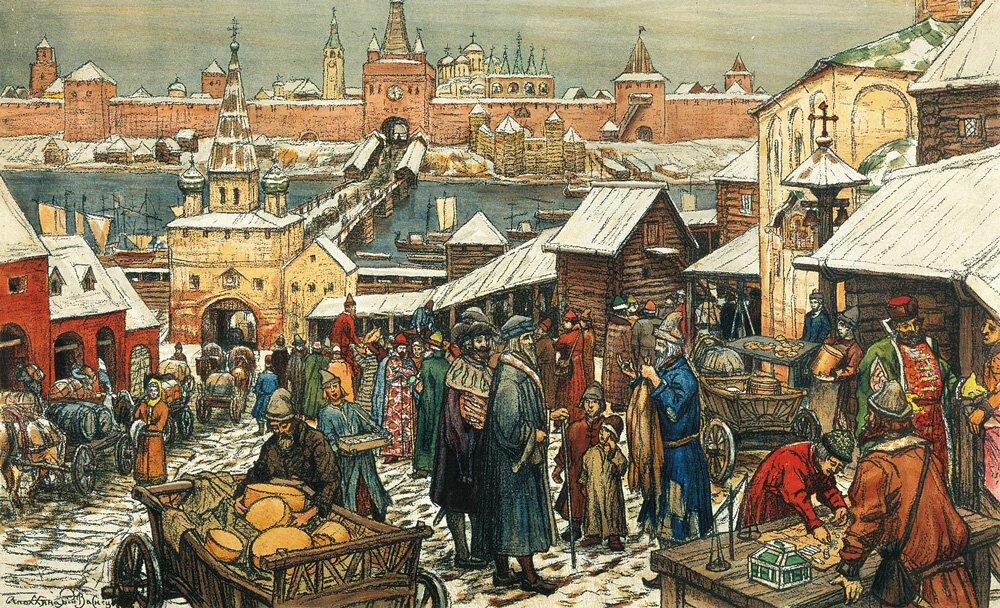Runequest Thursday #10 - Rules for Barter and Trade!

One of the cool things about Runequest is the emphasis on social situations. Yeah, you may go down into dungeons and kill monsters, but you are just as likely to find adventure dealing with the Praxian nomads traipsing through your fields taking anything that is not nailed down. And when you muster to drive them off, you see that they are hungry and tired, and so are their children. And these same nomads raided your neighbors last year, so you might be feeling some animosity, or at least suspicion. or you might be one of those same nomads, exiled or getting by however you can.
So what do you do?
This is the kind of situation that my Player Characters are dealing with in the River of Cradles-based game I am running - The Brightwater Saga. Briefly - the heroes have been hired to start a settlement in the unsettled portion of the River of Cradles to claim land before the Lunar Empire's settlers get there. For the past season, the heroes have been working to build up Brightwater, enticing settlers, hiring guards, making deals with locals, hunting, driving off or killing monsters,even delving into the occasional ruin for shiny things.
One of the things that the players came up with to help solidify Brightwater's place in the social and physical landscape of the region is a market. They had previously met a traveling merchant and convinced him to set up an official market once per season. Our last session ended the night before the market with a massive feast for all of the Brightwaters, their neighbors and guests. Next session is the market itself.
Which brings me to a problem, and the reason for this post. Rules for bargaining and trade. There are rules for these practices in the core books [Legend RPG or RQ6] but I was not a big fan of either, especially since several of my players are interested in trading and bargaining, but none of them are merchant specialists, preferring other cults to that of Issaries, the god of traders and merchants.
So I could penalize them at every turn by having other traders school them regularly, and remove the fun and socializing of the bargaining experience from the game, OR I could allow them the opportunity to participate, possibly excel, even though they don't spend huge amounts of their time in trade, and did not put loads of previous experience into it. I worked out a system that has only been tried once, but seemed to work, and gives the amateur the chance to get a deal from the specialist, while hopefully preserving some of the uncertainty and passion that arises during the process. here it is.
The Art of the Trade
If you wish to reduce or increase the value paid for an item, roll against Influence, Commerce, Bargain, or CHAx3. Your opponent will do the same. If you roll on CHA, you do not get a check in a skill.
- If you both fail, the price stands.
- If one of you succeeds, the price is raised or lowered [depending on the victor’s desire] by the % by which the person made their roll [a roll of 26 on a 60% skill would alter the price by 34%]. Someone has been significantly outmaneuvered.
- If you both succeed, the price is modified in favor of the one who made their roll by a greater amount. The amount by which the price is modified is equal to the difference between subtracting the loser’s margin of success and the winner’s.
- Situational modifiers may apply a +/- modifier to participant's chance to succeed. If a commodity is highly desirable, or desired, or if there are multiple buyers clamoring for it, a +20% to the owner's bargaining chance is appropriate.
Ex: Leo the Smiling is bargaining with a merchant to buy a minor Power Crystal. The Merchant is asking 2000L. Leo rolls against his CHA x3 [17x3=51%], getting a 32. The merchant rolls against his Bargaining skill of 75%, getting a 64. Because Leo succeeded by a great margin [19%, compared to the merchant’s 11%], he has talked the merchant into reducing the price!!! He has managed to reduce the selling price by 8% [19%-11%=8%].
Of course, you don't have to bargain. You can just pay the asking price. No problem. So if a character doesn't care, or has enough funds, or is afraid of being taken in, they can just pay without trying to negotiate. Of course, that character won't be getting any checks in Bargaining, or Influence, or Commerce, either and will have no choice but to pay full price or walk away.
Sometimes this can be safer, especially for characters that are not long on skills or smarts. Or if you are dealing with an experienced professional. After all, a tyro would not stand much chance against a swordmaster, so an amateur, even a talented one with decent bargaining or CHArisma, is unlikely to come out on top consistently in competition with an Issaries priest who does this every day.
Caveat Emptor: Like those bidding at auctions, bargainers often get carried away in the moment. NPCs who have lost out will nearly always agree to the bargain, though it may cause hard feelings in future, and the NPC may outright refuse to bargain or avoid a repeat situation.
PCs may attempt to avoid being outmaneuvered in Bargaining. They may roll INT x3 or less to avoid paying after having been out-bargained. If they succeed, they don't have to buy, but they also will not get the item they desire. Otherwise, they must accept the deal, even though it went against them. This is the danger of trying to get a deal. It is easy get carried away in the heat of negotiation, get bargained into a corner, and agree to something without thinking it through.
Caveat Emptor indeed.




